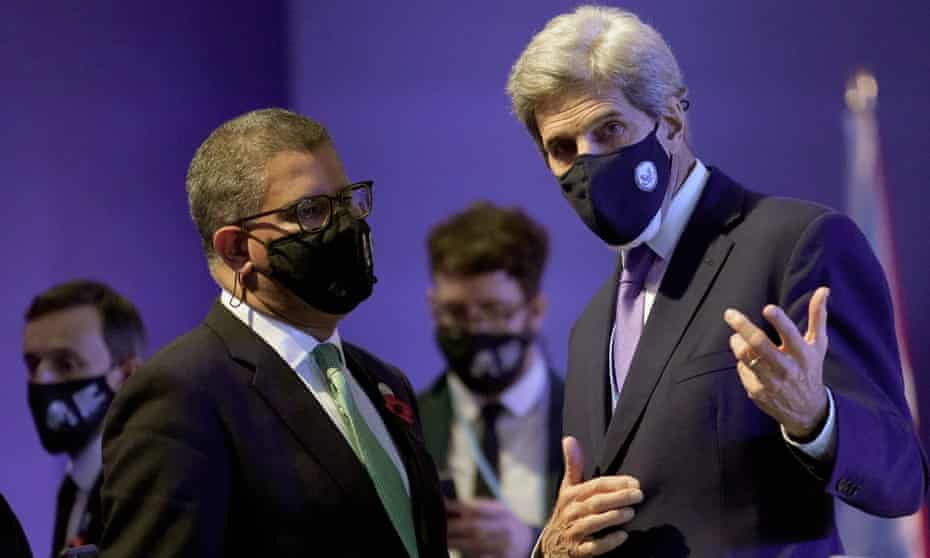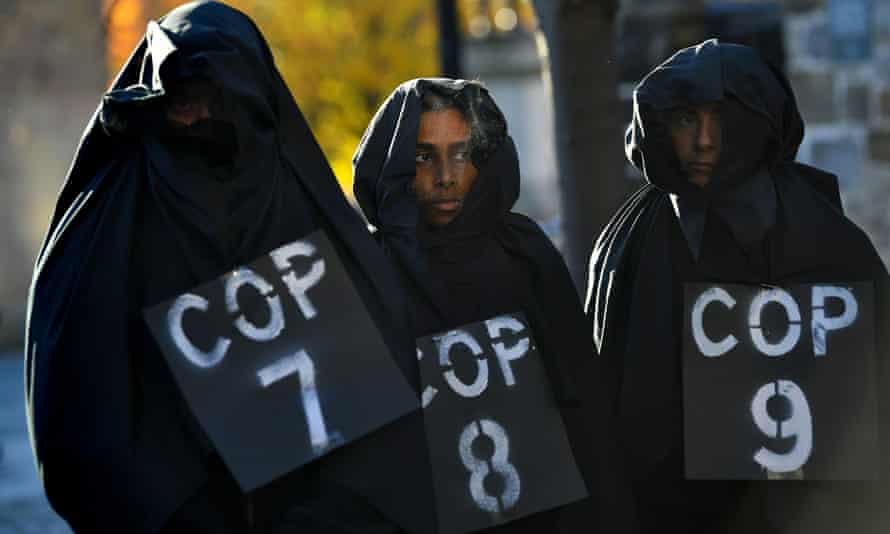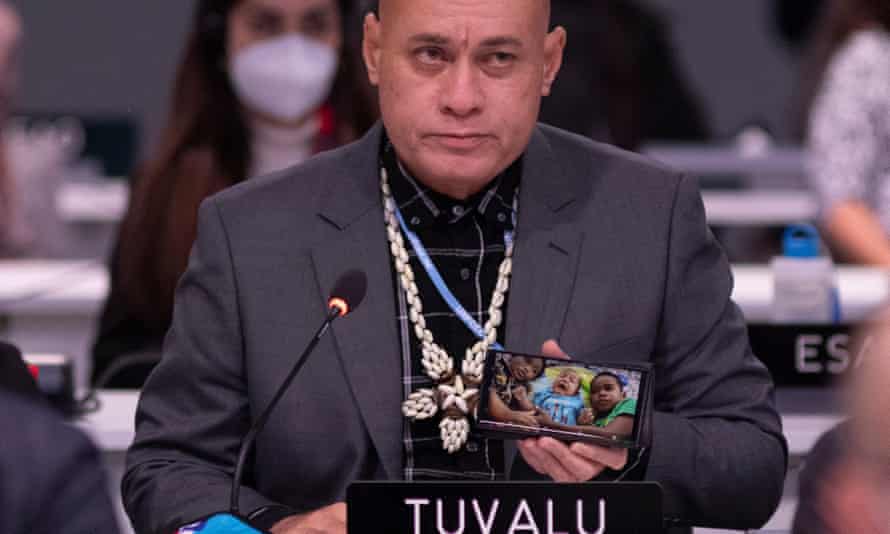Cash, coal, cars, trees… and choreography: how Britain kept Cop26 alive
High-profile initiatives were planned for the crucial summit. But as it went on, the lack of engagement with the toughest issues started to tell

“Cash, coal, cars and trees” to keep the world to 1.5 degrees – that was the catchy mantra coined by Boris Johnson’s spokesperson before the Cop26 conference, summarising the UK’s strategy of attacking the climate crisis on several fronts, to reverse the rise in greenhouse gas emissions and stave off climate breakdown.
That push was expressed in a carefully orchestrated string of initiatives covering those four key elements, and a few more, spread across the two weeks of the conference. The choreography was a key part of the UK’s plan: the Cop talks are dominated by backroom technical discussions over the fine details of the Paris agreement. Slow-moving and impenetrable to outsiders, these can give the (correct) impression of stalling and delay in the face of a global crisis.
So to gain a sense of momentum, the UK plan was to launch the summit with world leaders, then keep up a steady stream of “wins” that would cover aspects of the climate crisis that lie outside the scope of the annual UN talks but are no less vital to its resolution.
World leaders brought their glamour to the start, when Joe Biden of the US and his counterparts Fumio Kishida, the prime minister of Japan, the leaders of EU member states, Australia’s Scott Morrison and India’s Narendra Modi flew in among the 120 heads of state and government. Missing were Xi Jinping of China and Russia’s Vladimir Putin, but the leaders’ summit at the start gave the strong impetus the UK wanted.
There were some fireworks among the leaders: Morrison faced embarrassment as France’s Emmanuel Macron accused him of lying, in answer to a Guardian journalist’s question. Biden picked a fight with Xi when he remarked: “They didn’t show up … How do you do that and claim to have any leadership mantle?” Modi made the surprise announcement that India would pursue net zero emissions – by the late date of 2070, but significant nonetheless, according to experts.
As the leaders left the stage, the UK’s plan for cash, coal, cars and trees kicked in. The raft of announcements served two purposes: they addressed major sources of greenhouse gas emissions, or major elements of the solutions to the climate crisis; and they gave an impression of momentum, while the talks themselves were locked behind closed doors in interminable discussions over the minutiae of the final text.
The UK’s strategy bore fruit, said Bob Ward, policy director at the Grantham Research Institute on Climate Change and the Environment at the London School of Economics. “The contributions of the world leaders, particularly Narendra Modi, and the important announcements of stronger action on deforestation and methane, for instance, did provide positive momentum and had real substance. This was important as negotiators moved on to the hard grind of hammering out agreed text for the final decision.”

First among the initiatives was an agreement to halt deforestation by 2030, signed by more than 130 countries, on the second day of the talks. Forests act as carbon sinks but the loss and degradation of the rainforests of the Amazon, the Congo Basin and south-east Asia has vastly diminished their carbon-absorbing potential. Stemming the losses, restoring degraded land and planting new forests is essential to any attempt to limit temperature rises, and would strongly benefit nature and biodiversity.
Cash refers to the need for climate finance, from rich to poor countries to help them cut greenhouse gas emissions and cope with the impacts of the climate crisis. This has long been a key issue at the talks, one that dominated the closing discussions with developing countries deeply unhappy at the failure of the rich world to meet a promise made in 2009 that $100bn a year would flow to them from public and private sources by 2020. On the third day, more than 450 banks and financial institutions with a capitalisation of $130tn announced they would align their investments with net zero emissions by 2050, in a deal spearheaded by the former Bank of England governor Mark Carney.
He told Cop: “When the UK assumed the Cop presidency in partnership with Italy two years ago, $5tn of private financial assets were committed to net zero. Today, as part of the Glasgow financial alliance for net zero, over 450 major financial institutions from 45 countries are committing to manage their balance sheets totalling over $130tn in line with net zero. Make no mistake: the money is now there if the world truly wants to address climate change.”
Coal is the dirtiest fossil fuel, and continuing dependency on it is the biggest reason why greenhouse gas emissions are set to climb again next year, according to the International Energy Agency. On the fourth day of Cop26, more than 40 countries agreed to phase out coal power in what Kwasi Kwarteng, the business secretary, hailed as “a milestone moment in our global efforts to tackle climate change, as nations from all corners of the world unite in Glasgow to declare that coal has no part to play in our future power generation … the end of coal is in sight”.

Finally, in the second week of talks, the UK announced a deal on cars, by which more than 24 countries and several leading manufacturers committed to ending fossil fuel engines by 2040 or earlier, with Ford, Volvo and Mercedes-Benz among them.
As well as these carefully choreographed initiatives, the US and the EU came forward with a deal, involving scores of countries, to cut emissions of methane, a powerful greenhouse gas that comes from animal husbandry, fossil fuel exploration and waste. If successful, the pledge to cut methane by 30% by 2030 would knock an estimated 0.2C off global heating, a valuable contribution with temperatures currently 1.1C above pre-industrial levels and rapidly heading towards the 1.5C threshold.
But as the days wore on, and the announcements started to repeat or grow smaller in scope and impact, the hosts also came in for a barrage of criticism, as delegates suspected the announcements were not all that they seemed. First the forestry deal began to unravel, as Indonesia’s environment minister claimed the country was not intending to keep to its target of ending forest loss this decade.
Then the finance deal also appeared overblown. Although the 450 banks and institutions signed up have a capitalisation of $130tn, only a small slice of their investments will be devoted to low-carbon efforts in the crucial next decade. These banks are also allowed, under the terms of the deal, to carry on pouring money into fossil fuels.
Simon Youel of Positive Money said: “Banks may be preparing to scale up investment in ‘green’ activities, but this announcement said nothing about financial firms’ investments in new fossil fuel projects.”
When the spotlight fell on coal, the claim that the end of coal was in sight quickly fell apart. The full list of countries signing up to phasing out coal was not at first released to journalists – when it was, only 18 countries were found to have agreed to it, with most of the world’s biggest users, including China, India and the US, missing. And when the cars announcement finally came in the second week of the conference, it was found that many major manufacturers – including Volkswagen, Toyota and BMW – had failed to sign up.
The end result was for some delegates an appearance of spin, even greenwash. Mohamed Adow, director of the thinktank Power Shift Africa, accused the UK of “dressing up empty promises as climate leadership”, by pursuing fossil fuels at home – through new oil and gas fields, a potential new coalmine – and cutting overseas aid while exhorting other countries to provide more climate finance to the poor.
He said: “It’s clear that rich nations would rather make pre-planned announcements and launch new schemes rather than get around the negotiating table with countries on the frontline of the climate crisis and commit their decisions to enhanced [national plans for emissions cuts] or the delivery of the promised $100bn by 2020.”
Jennifer Morgan, executive director of Greenpeace International, said: “Most host governments dabble in a bit of media management but the UK’s communications strategy in Glasgow is something different. It seems designed to dampen transparency and integrity. We actually want to find things to celebrate but it’s hard when there is a constant concern that everyone is getting played.”
For the UK, if these deals produce tangible outcomes in the coming months and years, it will be vindication of a strategy that sought to spread the push for climate action beyond the narrow confines of a Cop meeting, where the focus is on the legalese and minutiae of a dry text – and where the discussions over the “rulebook” for the Paris agreement alone have taken six years, with some aspects still not fully resolved. If the “side deals” prove to bear fruit in lower emissions, concerns about spin will be quickly forgotten.
A Cop26 spokesperson said: “We saw real momentum for climate action in the first week of Cop26, including major new commitments on ending our reliance on coal, increasing climate finance, tackling deforestation and plans to cut emissions. These were clearly communicated, showing the level of ambition at the summit and providing a firm foundation for further productive negotiations as we worked towards a final agreement.”
